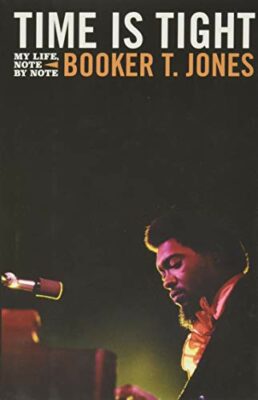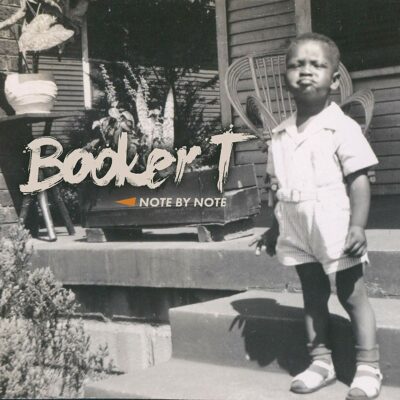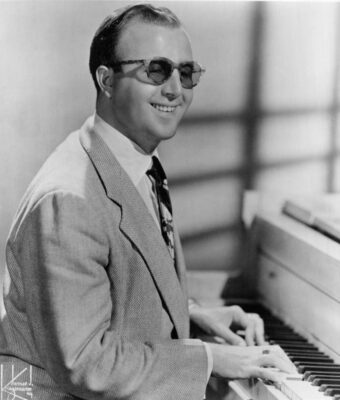This year marks the 60th anniversary of the release of the Booker T. & the MGs 1962 instrumental “Green Onions,” a soul classic that not only topped off at number 3 on the Billboard Hot 100, but became emblematic of the rich Stax/Volt sound coming out of Memphis that would rival Motown’s output up through the early ‘70s. Along with guitarist Steve Cropper, drummer Al Jackson Jr. and bass player Lewie Steinberg (who was eventually replaced by Donald “Duck” Dunn), group namesake Booker T. Jones was part of the house band for the storied label while carving out an impressive legacy for the group itself while becoming one of the first racially integrated rock groups.

(Photo by Piper Ferguson/courtesy of Booker T. Jones)
Unhappy with Stax’s new leadership, Jones moved to California and left both the group and label in 1971, only to enjoy one of the great career second acts. It’s a journey captured in Time is Tight: My Life, Note by Note, a memoir Jones penned and simultaneously released with Note By Note, his most recent studio album. With the seeds planted for this autobiography back in 2007, the Tennessee native took his time pulling his story together.
“I wrote the book on American Airlines napkins, Holiday Inn notepads and even in a notebook at my son’s soccer games and it took me about 10 to 12 years to get it done,” he explained.
 In his memoir, Jones shares the triumphs he’s had within and outside of the MGs thanks to deep musical skills that led to this former child prodigy collaborating with a broad range of artists including Willie Nelson, Rosanne Cash, Neil Young, Bill Withers and Taylor Dayne. At the same time, the septuagenarian Rock & Roll Hall of Famer didn’t shy away from the tragic losses of close friends and loved ones (Otis Redding, ex-wife Priscilla Coolidge, Jackson Jr.) that he experienced and proved to be one of the greater challenges with this project.
In his memoir, Jones shares the triumphs he’s had within and outside of the MGs thanks to deep musical skills that led to this former child prodigy collaborating with a broad range of artists including Willie Nelson, Rosanne Cash, Neil Young, Bill Withers and Taylor Dayne. At the same time, the septuagenarian Rock & Roll Hall of Famer didn’t shy away from the tragic losses of close friends and loved ones (Otis Redding, ex-wife Priscilla Coolidge, Jackson Jr.) that he experienced and proved to be one of the greater challenges with this project.
“I remember being in either Cleveland or Cincinnati at the airport and Al Jackson getting a call from his wife that Otis had crashed with six of our other people on that plane,” he recalled. “When you’re 23, you’re too young to handle that and don’t know what to do. Going back to remember makes it happen twice.”
 Fast forward to the present and like so many other artists in the music industry, Jones wound up having his touring plans derailed when the pandemic locked down the entire touring circuit. While he kept busy revamping his home studio (“Since I had to cancel so many gigs, I worked on optimizing my work space”) and launching the Book Records imprint with National frontman Matt Berninger, which served as the springboard for the latter’s solo debut Serpentine Prison, Jones is itching to get back on the road. In the meantime, he shared some of his favorite players with Long Island Weekly.
Fast forward to the present and like so many other artists in the music industry, Jones wound up having his touring plans derailed when the pandemic locked down the entire touring circuit. While he kept busy revamping his home studio (“Since I had to cancel so many gigs, I worked on optimizing my work space”) and launching the Book Records imprint with National frontman Matt Berninger, which served as the springboard for the latter’s solo debut Serpentine Prison, Jones is itching to get back on the road. In the meantime, he shared some of his favorite players with Long Island Weekly.

(Public domain)
George Shearing (August 13, 1919 to February 14, 2011)
“[He’s a favorite because he] couldn’t see and he came up with a new melodic concept of playing the melody in octaves and filling in the harmony notes in-between. I do it on a version of ‘Stardust’ that I haven’t recorded yet. It’s just an amazing concept.”

(Photo by Victor Diaz Lamich/ CC BY 3.0)
Ray Charles (September 23, 1930 to June 10, 2004)
“I loved Ray Charles on electric piano and saxophone. He influenced Hank Crawford. The way he played his grace notes by putting two fingers close together—it’s like he’s trying to get in-between two keys. Who did that before Ray Charles? I don’t know. That was the one thing that made me think I would have no complaints in life if I could go and play that instrument and that’s what has happened to me.”
Visit www.bookert.com to find out more about Booker T. Jones.



































